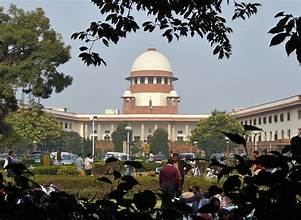Despite best efforts by Chief Justice of India DY Chandrachud to streamline the day-to-day operations of the Supreme Court, the pendency of cases in the Apex Court reached an all-time high of 82,989 in 2024, including 39,254 applications filed this year, while the disposal rate stood at nearly 94.92 percent (37,259 cases).
The figures were recently released by the National Judicial Data Grid (NJDG). As per the government portal, out of 82,989, 27,729 matters have remained pending for less than one year.
It said that 1,130 cases were pending before a three-judge bench, 274 cases before a five-judge Constitution bench, 37 before a seven-judge Constitution bench, and 136 cases were awaiting adjudication before a nine-judge bench.
Ever since he assumed office in November 2022, CJI Chandrachud has taken various measures to streamline the working of the Apex Court and Registry, including IT initiatives, clubbing of cases, and strengthening the listing process.
The top court of the country also organised a Special Lok Adalat from July 29 to August 3, 2024, to facilitate an amicable settlement of suitable pending cases. Out of the 2,200 matters, 1,100 were successfully disposed of.
CJI Chandrachud will retire in November, 2024.
While delivering a verdict in a 1982 civil dispute, the Supreme Court had last year expressed concern over the pendency of cases in the country. It issued 11 directives to ensure the speedy disposal of cases, warning that public confidence in the legal process may erode if proceedings continued at a slow pace.
The Bench of Justice S Ravindra Bhat and Justice Aravind Kumar further issued a slew of directions to the High Courts to ensure speedy trials and to monitor the disposal of cases, especially those pending for over five years.
The Bench recorded in its order that the litigants would become disillusioned if the legal process moved at a snail’s pace. It also expressed concern over litigations pending for more than 60 years in the states of West Bengal, Uttar Pradesh and Maharashtra, as well as those awaiting adjudication for the past 50 years.
The Apex Court further noted that the litigants should be circumspect in seeking adjournments and should not mistake the kindness of presiding officers for weakness.


